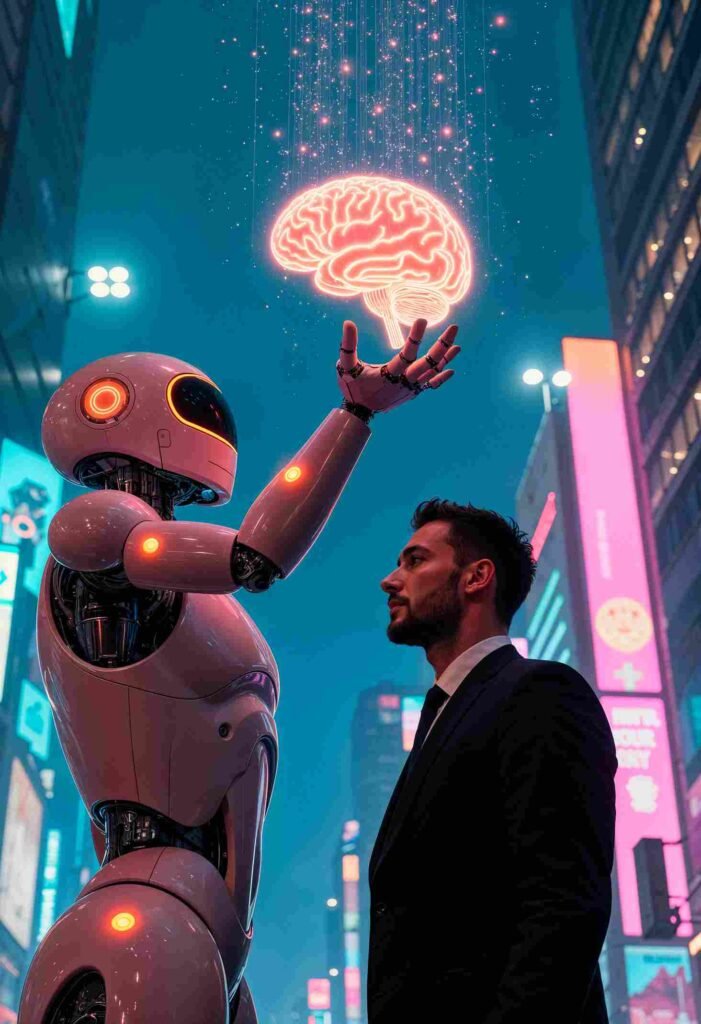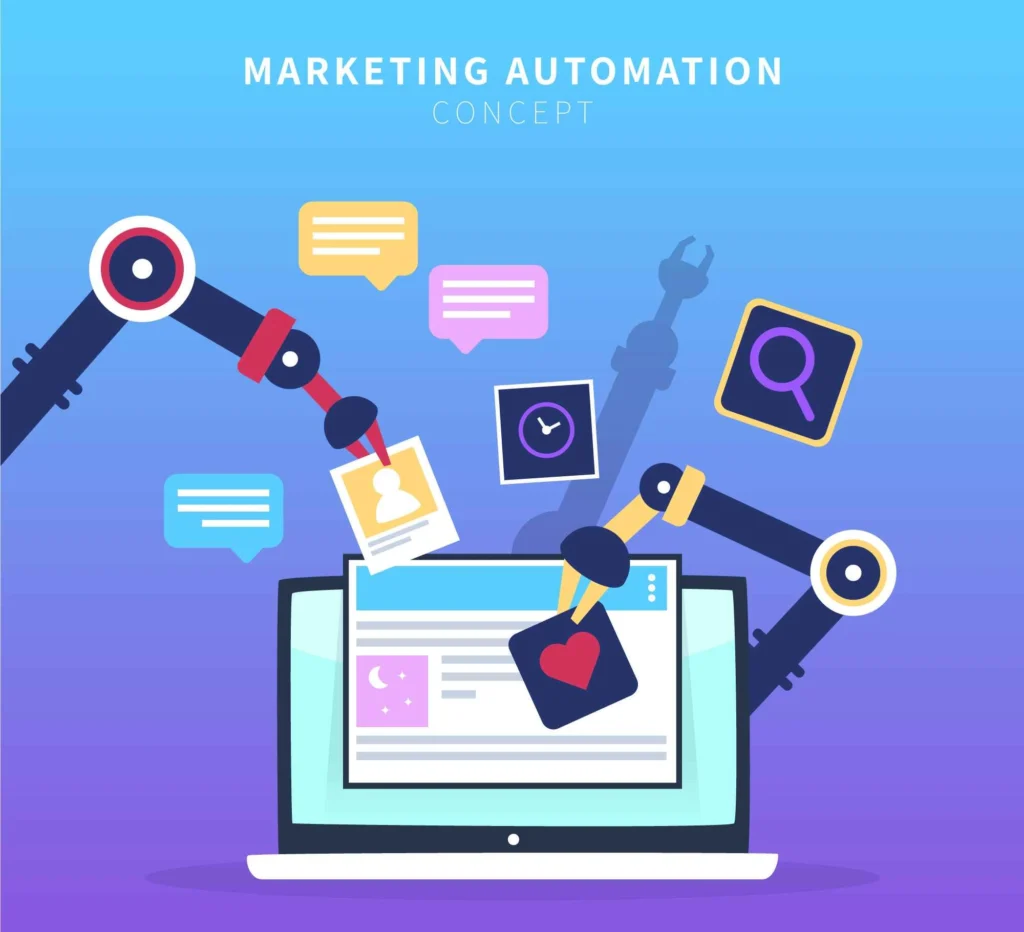
The growth and development of AI have been extremely impactful and have changed the world in a big, groundbreaking way. Artificial intelligence is now a part of digital marketing, from chatbots that respond to customer queries in a matter of seconds to algorithms that determine which advertisements you are most likely to click on. Every week, a new artificial intelligence tool claims to “do your marketing for you” more quickly, more affordably, and more intelligently than a human could. Let’s explore the blogs and understand what it actually is.
It makes sense that a lot of experts are wondering if AI will replace strategic digital marketers.
The answer is no. AI will never replace strategic digital marketers. Although AI will shape our workflow, it can never replace the human brain that develops strategic marketing. AI is capable of running campaigns, writing blog drafts, and evaluating large amounts of data, but it is not as creative, sensitive to cultural differences, or can make moral decisions as humans. From this, we can understand how important is human hands and why AI will never replace strategic digital marketers.
Effective marketing is all about strategy building, genuine connections, and telling stories that connect on a human level; it is not just about automation and speed.
This blog will discuss why AI will never replace strategic digital marketers, as well as its strengths and limitations. It will also discuss how the future depends on a strong collaboration between human creativity and technological efficiency.
The Increase of AI in Digital Marketing

AI is no longer a futuristic idea because it is now a major component of the tools and platforms that marketers use on a daily basis. Artificial intelligence is used in the background by Google Ads to instantly adjust bids, social media algorithms to customize content feeds, and email platforms to automatically send personalized messages
Here are some most commonly used applications of AI in marketing:
-
- Virtual assistants and chatbots that respond to customer questions at any time
-
- Estimating campaign outcomes and consumer behavior insights.
-
- Ad copy, blog drafts, and captions can be created with content generation tools like ChatGPT.
-
- Ads are purchased and placed more effectively by programmatic advertising than by manual means.
-
- Posts are scheduled and optimized for optimal engagement through social media automation.
The benefits of AI are undeniable:
-
- Speed: AI processes data very quickly and generates results.
-
- Efficiency: It saves time for creative hunting by automating repetitive tasks
-
- Expandability: It can smoothly handle increasing data loads and growing campaigns.
-
- Despite all of its potential, artificial intelligence has certain limitations, and human marketers excel in these areas.
Where AI Succeeds — And Where It Fails: AI’s advantages in marketing
-
- Automation of repetitive tasks: When it comes to scheduling, AI is more effective than humans.
-
- Large-scale data analysis: Millions of data points can be analyzed by AI, where it would be difficult for humans.
-
- Content creation speed: With programs like Copy.ai, ChatGPT, and Jasper, Quick script, article, and caption drafting is possible.
However, this is where AI fails :
-
- Lack of emotional intelligence: AI is capable of mimicking tone, but it lacks emotion. It is unable to truly relate to an audience.
-
- Limited creativity: Since AI is trained on already existing data, it can only produce what is taught to be produced; it struggles to produce truly varied ideas.
-
- Cultural sensitivity and context: AI can misunderstand some ways of speaking jokes and informal expressions because it depends on shared experiences, tone, and cultural background
-
- Moral judgment: Human depends upon brand value, trends, reputation, and societal impacts, but AI does what it is told to do.
For example, an AI may suggest some memorable advertising slogans for a particular country, but it may unintentionally offend in another country. A human marketer who is culturally aware would not make that type of mistake. And that’s what this points out AI will never replace strategic digital marketers.
The Irreplaceable Human Touch in Marketing

Beyond merely conveying a message, effective marketing aims to establish an emotional connection with consumers—something AI cannot do.
1. Emotional connection & Empathy: The foundation of marketing is human psychology. Brands that understand human emotions and can be connected with human psychology win people’s minds rather than AI, which cannot understand the difficulties faced by small businesses and a mother trying to save money.
2. Engaging storytelling: Storytelling is the best marketing strategy that can be used. They help people remember and relate to brands. Although AI can create stories, it lacks the life experiences and touch that lend stories their authenticity.
3. Ethical judgement: Human marketers don’t just make decisions based on the return on investment. For instance, after a tragic incident, should a campaign be discontinued? Humans understand the important, sensitive topics, even if AI doesn’t.
4. Creativity and Innovations: Innovative ideas mostly come after thinking beyond the box and taking risks, areas where AI lacks because it acts according to the historical data it has been trained on.
Strategy Is More Than Data
AI does a great job of alerting you to events, but humans still determine why they are important and how to respond to them.
A successful marketing plan includes:
-
- Identifying emerging patterns and cultural shifts before data shows them.
-
- Recognizing unspoken customer needs.
-
- Combining evaluated data to create a unified brand story.
Looking back to the COVID-19 days, many brand turned their typical marketing strategies to ones that focused on empathy and support. AI algorithms trained solely on historical data would not have changed that without human intervention.
Intuition, which has been refined through years of experience and trial and error, is another component of strategy. For this reason, human marketing directors and creative leads are still used by even the most data-driven businesses.
AI Will Never Replace Strategic Digital Marketers, but will work together in the future rather than compete with one another
Marketers should see AI as a partner to work alongside, rather than fearing it. Here, AI will never replace strategic digital marketers, but AI performs best when human supervision, imagination, and foresight are combined with it.
Why the Collaboration Is Successful:
AI takes care of the labor-intensive data analysis, allowing humans to concentrate on larger concepts. Campaigns benefit from human emotional intelligence and adaptability. Together, they produce faster, smarter, and more successful marketing.
Marketers Must Have These Skills to Succeed in the AI Age:
-
- Using critical thinking to assess AI’s recommendations.
-
- Campaigns can be made to resonate by using storytelling.
-
- cultural sensitivity to guarantee applicability.
-
- moral decision-making to preserve the integrity of the brand.
Useful Advice for Marketers on How to Use AI Without Losing Their Human Edge
-
- Use AI to handle repetitive duties like data analysis, keyword research, and the creation of simple content drafts.
-
- Never forget to add a human touch by adding your distinct brand voice and emotional depth to AI-generated content.
-
- Test and adapt: Assess performance and make necessary adjustments rather than mindlessly following AI’s advice.
-
- Remain creative by using the time AI saves to come up with original campaign ideas.
-
- Pay attention to relationships: humans are better at networking, going to events, and forming alliances than AI.
Conclusion
Even though AI has a major role in changing digital marketing and is shaping marketing, human marketing still plays an important role and cannot be replaced, as it is said. This change in marketing opens a new approach in which humans concentrate on strategy development and building real connections, while AI handles data-driven repetitive tasks. Marketers who see AI as a partner will have a space in the marketing industry of the future.
So let’s answer the question of whether AI will replace strategic digital marketers. No, but marketers who can work well with AI will do better than those who can’t.